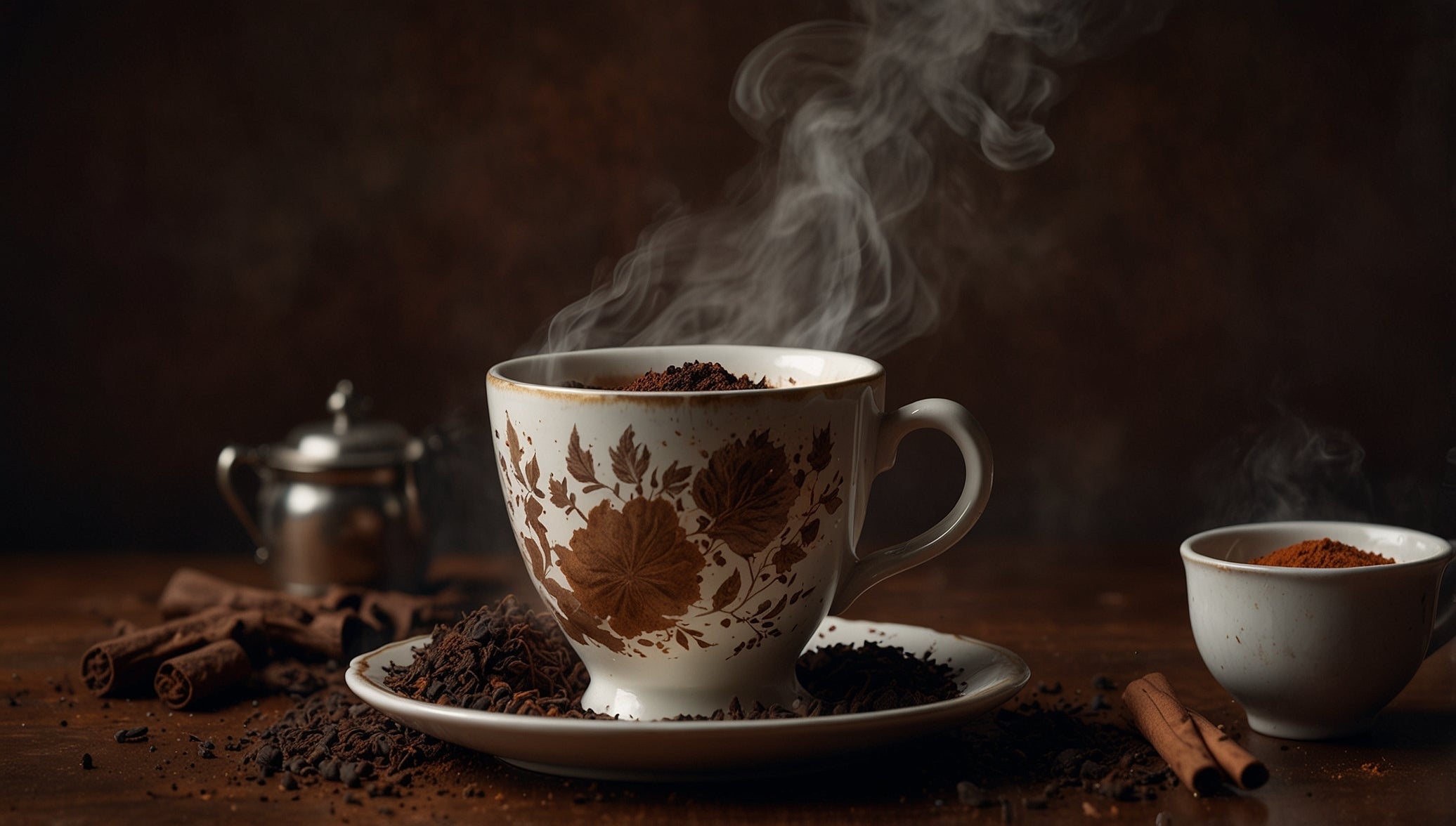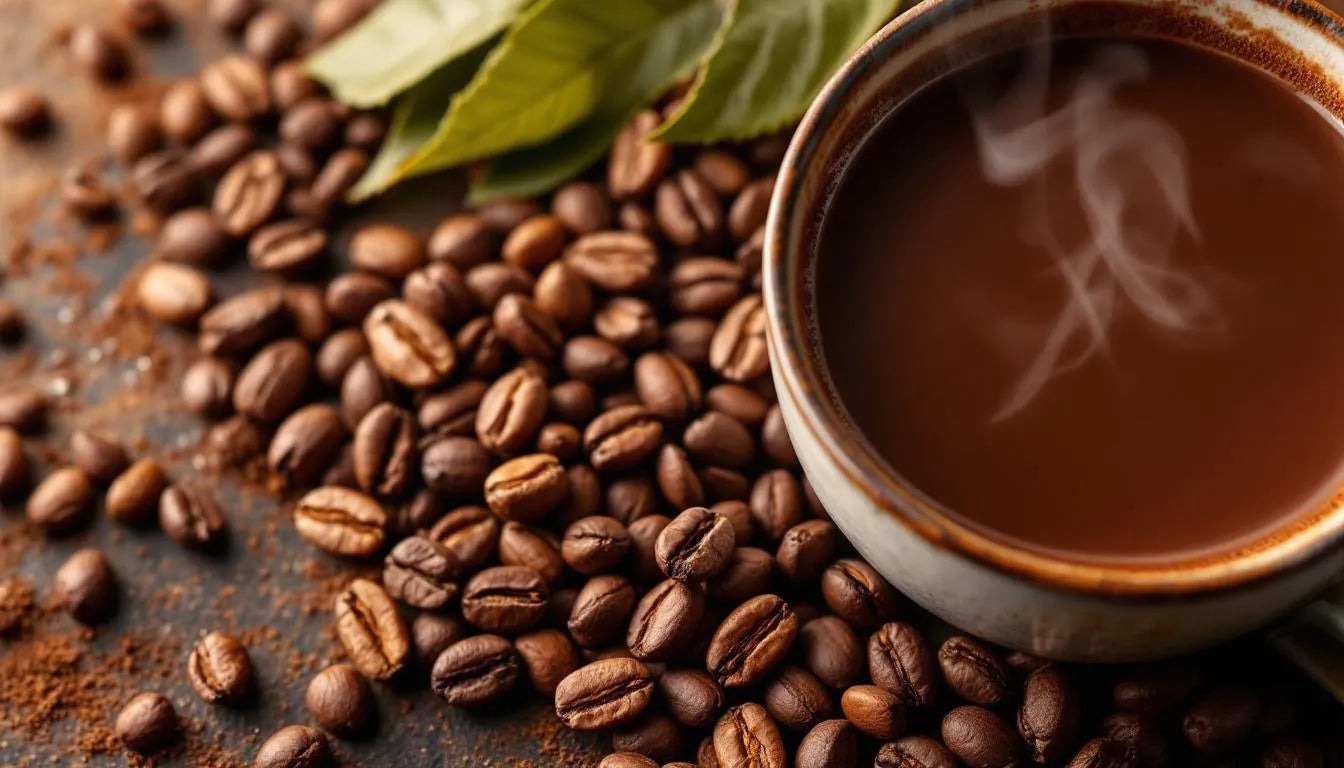
Cocoa and Tea: Discovering the Synergistic Benefits of Two Ancient Superfoods
The Perfect Pairing: Why Cocoa and Tea Work Better Together
Cocoa and tea represent two of nature's most powerful antioxidant sources, each with centuries of traditional use and modern scientific validation. When combined, these ancient beverages create a synergistic effect that amplifies their individual health benefits. Recent research reveals that cocoa has more phenolic phytochemicals and a higher antioxidant capacity than teas and red wine, making it an exceptional partner to tea's already impressive nutritional profile.

The rising popularity of cocoa and tea combinations reflects a growing understanding of how these superfoods complement each other. While each beverage offers unique benefits individually, their combination provides a more complete spectrum of antioxidants, minerals, and bioactive compounds that support overall wellness in ways that neither can achieve alone.
Antioxidant Powerhouse: How Cocoa and Tea Compare
Breaking Down the Numbers
Scientific comparisons have revealed surprising insights about the antioxidant content of these beloved beverages. Researchers at Cornell University have shown that the popular winter beverage contains more antioxidants per cup than a similar serving of red wine or tea and may be a healthier choice. Specifically, the research shows remarkable differences in antioxidant capacity:
- Cocoa: 611 mg/serving of gallic acid equivalents
- Green Tea: 165 mg/serving of gallic acid equivalents
- Black Tea: 124 mg/serving of gallic acid equivalents
- Red Wine: 340 mg/serving of gallic acid equivalents
The Flavonoid Advantage
Cocoa contains more phenolic antioxidants than most foods. Flavonoids, including catechin, epicatechin, and procyanidins predominate in antioxidant activity. These compounds work differently than tea's polyphenols, creating complementary antioxidant effects when consumed together.
Stability and Longevity
One fascinating discovery about cocoa's antioxidants is their remarkable stability. milk chocolate bars maintain oxygen radical absorbance capacity (ORAC), total polyphenols, and flavan-3-ol monomers for at least 50 weeks in commercial preparations, whereas cocoa powder and cocoa beans demonstrate stability in samples over 75 years old. This stability ensures that cocoa-tea blends maintain their potency over time.
Heart Health Benefits: A Cardiovascular Dream Team
Blood Pressure and Circulation
Cocoa, cacao, and dark chocolate may help lower blood pressure because they improve the blood's nitric oxide levels. When combined with tea's cardiovascular benefits, this creates a powerful heart-healthy beverage. The flavonoids in both cocoa and tea work through complementary mechanisms:
- Relaxing and dilating blood vessels
- Improving endothelial function
- Reducing inflammation in arterial walls
- Preventing blood clot formation
Cholesterol Management
The combination of cocoa and tea provides dual support for healthy cholesterol levels. While tea helps prevent LDL oxidation, cocoa actively improves the ratio of HDL to LDL cholesterol. This complementary action offers more comprehensive cardiovascular protection than either beverage alone.
Enhanced Blood Flow
Products like Coracao's Spicy Dark Drinking Chocolate - 70% combine the circulatory benefits of cocoa with warming spices, creating beverages that support optimal blood flow throughout the body.

Unique Compounds: Theobromine Meets L-Theanine
The Energy Balance
One of the most remarkable aspects of combining cocoa and tea is how their unique compounds create balanced energy. Cocoa tea made from Malaysia and Venezuela origin had a higher theobromine content and a much lower caffeine content compared to green tea. This creates a gentle, sustained energy experience:
- Theobromine from Cocoa: Provides smooth, long-lasting energy
- L-Theanine from Tea: Promotes calm focus and reduces caffeine jitters
- Combined Effect: Alert relaxation without anxiety
Mood Enhancement Synergy
The phenylethylamine in cocoa combines with tea's L-theanine to create a unique mood-lifting experience. This combination supports:
- Increased focus and concentration
- Reduced stress and anxiety
- Enhanced feelings of well-being
- Improved cognitive performance
Complementary Stimulation
Unlike coffee's isolated caffeine hit, cocoa and tea provide a more nuanced stimulation that many describe as both energizing and calming. This makes the combination ideal for sustained mental performance without the typical caffeine crash.
Cancer Prevention and Immune Support
Powerful Anti-Cancer Properties
Studies show that the antioxidant effects in cocoa may help protect cells against damage from free radicals. These antioxidants also help inhibit cancer cell growth, promote cancer cell death, boost the immune system, fight inflammation, and reduce cancer risk. When combined with tea's well-documented anti-cancer properties, this creates a potent preventive beverage.
Immune System Enhancement
Both cocoa and tea support immune function through different mechanisms:
- Cocoa: Provides zinc, iron, and selenium for immune cell production
- Tea: Offers catechins that enhance immune response
- Combined: Creates comprehensive immune system support
Anti-Inflammatory Effects
The anti-inflammatory compounds in both beverages work synergistically to reduce chronic inflammation, a key factor in many diseases. This combined effect is greater than either beverage consumed separately.
Weight Management and Metabolic Benefits
Appetite Regulation
The fiber content in cocoa combined with tea's metabolism-boosting properties creates an effective tool for weight management. It has less caffeine than coffee, so you'll get a nice energy boost without those unnecessary caffeine jitters, making it easier to maintain healthy eating patterns.
Metabolic Enhancement
Both beverages support healthy metabolism through different pathways:
- Increasing fat oxidation
- Improving insulin sensitivity
- Supporting healthy blood sugar levels
- Enhancing thermogenesis
Sustainable Energy for Exercise
Products like Coracao's Hazelnut Chocolate Bars provide the perfect pre-workout energy when paired with green tea, offering sustained fuel without digestive upset.
Creating the Perfect Cocoa and Tea Blend
Choosing Your Base Tea
Different teas create unique flavor profiles and health benefits when combined with cocoa:
- Green Tea + Cocoa: Maximum antioxidants with a fresh, slightly bitter profile
- Black Tea + Cocoa: Rich, robust flavor with moderate caffeine
- White Tea + Cocoa: Delicate, sweet combination with low caffeine
- Herbal Tea + Cocoa: Caffeine-free options with specific therapeutic benefits
Preparation Methods
The highly satisfying cocoa/tea combination is a great alternative to your morning cup of coffee. To prepare the perfect blend:
- Brew tea at appropriate temperature (varies by type)
- Add 1-2 teaspoons of raw cocoa powder
- Whisk thoroughly to prevent clumping
- Sweeten naturally if desired
- Add plant-based milk for creaminess
Flavor Enhancement Options
Enhance your cocoa-tea blend with:
- Cinnamon for blood sugar support
- Ginger for digestive benefits
- Vanilla for natural sweetness
- Cardamom for exotic flavor
- Cayenne for metabolism boost

Regional Variations and Quality Considerations
Origin Matters
Venezuela raw cocoa bean hull had the highest antioxidant properties and these properties can tolerate roasting up to 100 ⁰C. Different regions produce cocoa and tea with varying beneficial compound profiles:
- South American Cocoa: Higher theobromine content
- African Cocoa: Balanced flavor profiles
- Asian Teas: Diverse polyphenol profiles
- Combined Benefits: Maximized by sourcing quality ingredients
Processing Impact
The way cocoa and tea are processed significantly affects their health benefits. Raw, minimally processed options retain the most beneficial compounds. Choose products that prioritize gentle processing methods to maximize nutritional value.
Organic and Fair Trade Importance
Selecting organic, fair-trade cocoa and tea ensures:
- No pesticide residues
- Higher antioxidant content
- Ethical sourcing practices
- Environmental sustainability
Scientific Evidence: What Research Reveals
Comparative Studies
Lee et al. found that cocoa contains 611 mg/serving of gallic acid equivalents and 564 mg/serving of epicatechin equivalents. The values for gallic acid equivalents were 1.8, 3.7, and 4.9 higher than those obtained for red wine, green tea, and black tea, respectively. This research validates the exceptional antioxidant capacity of cocoa when compared to other popular beverages.
Synergistic Effects Research
While individual studies on cocoa and tea are extensive, emerging research on their combination shows:
- Enhanced bioavailability of beneficial compounds
- Complementary antioxidant mechanisms
- Improved cardiovascular outcomes
- Better cognitive performance
Long-term Health Outcomes
Regular consumption of cocoa and tea combinations has been associated with:
- Reduced risk of chronic diseases
- Improved longevity markers
- Better quality of life scores
- Enhanced mental well-being
Incorporating Cocoa and Tea into Your Daily Routine
Morning Rituals
Start your day with a cocoa-tea blend to:
- Provide sustained energy without crashes
- Support mental clarity and focus
- Deliver protective antioxidants
- Set a positive mood for the day
Afternoon Pick-Me-Up
Replace your afternoon coffee with cocoa-tea for:
- Gentle energy boost
- Reduced anxiety and jitters
- Better sleep quality later
- Continued antioxidant protection
Evening Relaxation
Choose caffeine-free herbal teas with cocoa, or try Coracao's Love Potion Drinking Chocolate - 69% for a soothing evening ritual that supports:
- Stress reduction
- Better sleep preparation
- Nighttime recovery
- Mood enhancement
Special Considerations and Precautions
Caffeine Sensitivity
While cocoa and tea contain less caffeine than coffee, sensitive individuals should:
- Start with small amounts
- Choose lower-caffeine tea varieties
- Avoid evening consumption
- Monitor individual responses
Medication Interactions
Both cocoa and tea can interact with certain medications:
- Blood pressure medications
- Anticoagulants
- Stimulant medications
- Iron supplements
Always consult healthcare providers about potential interactions.
Quality Over Quantity
Focus on high-quality, minimally processed products rather than consuming large quantities of lower-quality options. The health benefits are directly related to the quality of ingredients used.
The Future of Cocoa and Tea Combinations
Innovation in Products
The growing understanding of cocoa and tea synergies is driving innovation in:
- Ready-to-drink beverages
- Functional food products
- Supplement formulations
- Culinary applications
Personalized Nutrition
As we learn more about individual responses to these compounds, personalized cocoa-tea blends may become common, tailored to:
- Genetic profiles
- Health goals
- Taste preferences
- Lifestyle needs
Sustainable Practices
The future of cocoa and tea production focuses on:
- Regenerative agriculture
- Climate-resilient varieties
- Fair compensation for farmers
- Minimal environmental impact
Conclusion: Embracing the Power of Cocoa and Tea
Cocoa and tea together represent more than just a delicious beverage combination – they offer a scientifically validated approach to enhancing health through natural compounds. With cocoa providing superior antioxidant capacity and tea offering its own unique benefits, their combination creates a synergistic effect that supports cardiovascular health, cognitive function, immune strength, and overall well-being. By choosing high-quality products and incorporating them mindfully into your daily routine, you can harness the combined power of these ancient superfoods for modern health optimization.

Claire Bennett
I'm Claire, a chocolate lover and artisan based in a small town where I run a tiny home kitchen dedicated to exploring everything chocolate. From single-origin dark bars to creamy ganache and handmade truffles, I find joy in working with all types of chocolate. I believe chocolate has a story, and I love bringing that story to life through humble, heartfelt creations.



Leave a comment
This site is protected by hCaptcha and the hCaptcha Privacy Policy and Terms of Service apply.